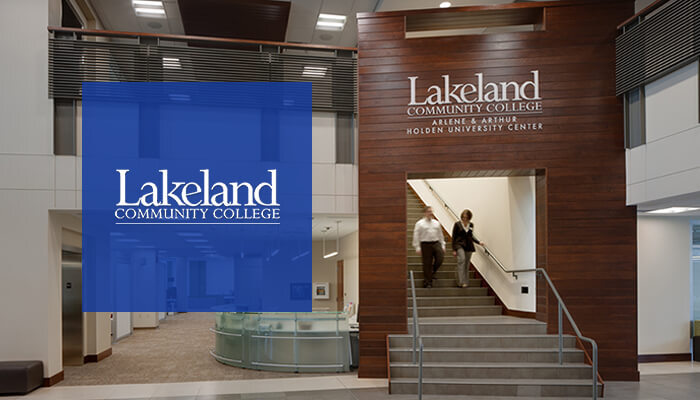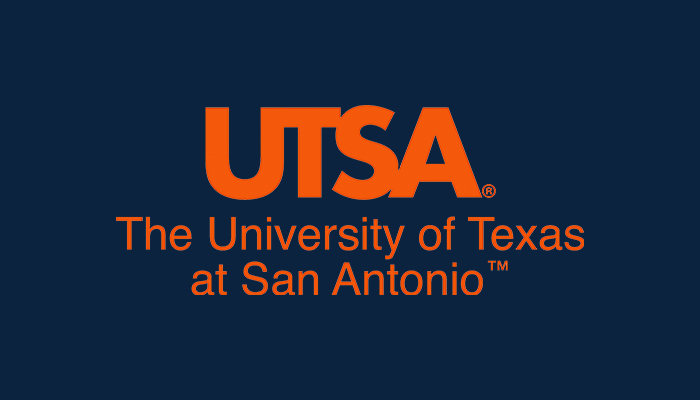
Using Course Insights to Improve Academic Performance
Share this Post
For many institutions, gathering the right insights to uncover where problems truly lie in their curricula is challenging. Siloed academic departments and inaccessible data create roadblocks when analyzing course success and determining where to make adjustments. These inefficiencies directly impact students– just one course can create a significant barrier, affecting academic performance and even threatening persistence. But with the right information, these obstacles can be removed from the student experience.
Whether large or small, private or public, institutions constantly strive to cultivate an environment where every student can thrive. However, achieving this goal takes more than conventional practices; it requires actionable insights and strategic interventions based on leading indicators, such as the impact of specific courses on overall persistence.
Civitas Learning partners are doing just that– intentionally utilizing real-time insights to fully understand which undergraduate courses have the largest potential to affect persistence and graduation rates at their institutions.
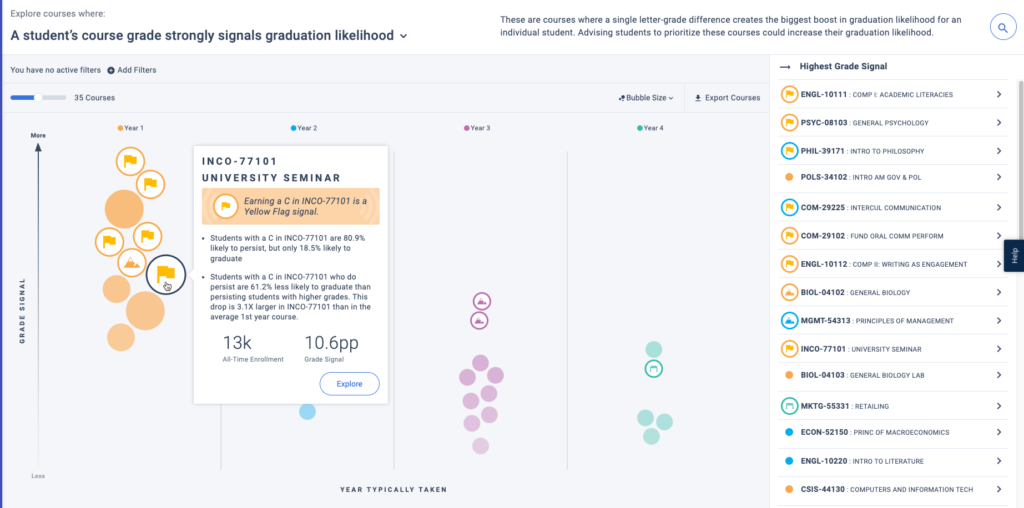
Identifying Bottleneck Courses to Deliver Precise Academic Support
Visibility into the impact individual courses have on persistence and graduation empowers provosts, academic deans, advising teams, and faculty members to identify and address barriers to student success in a clear, purposeful way. With this level of insight, institutions can pinpoint specific areas where students may face challenges and tailor support mechanisms accordingly.
Digging deeper into the analytics of individual courses illuminates the nuanced interplay between academic programming and persistence that can easily be missed. For instance, numerous pain points can negatively impact a student’s performance, including insufficient academic preparation or simply not knowing what supports are available to help them succeed in challenging classes.
When institutions know precisely which courses make persistence difficult, they can take action to make outreach more effective and connect students with the right resources and support, such as supplemental instruction, tutoring, or tailored workshops. Equipped with real-time insights, interventions can be more strategic and designed to precisely address gaps in skills or structures that are causing students to struggle in the class.
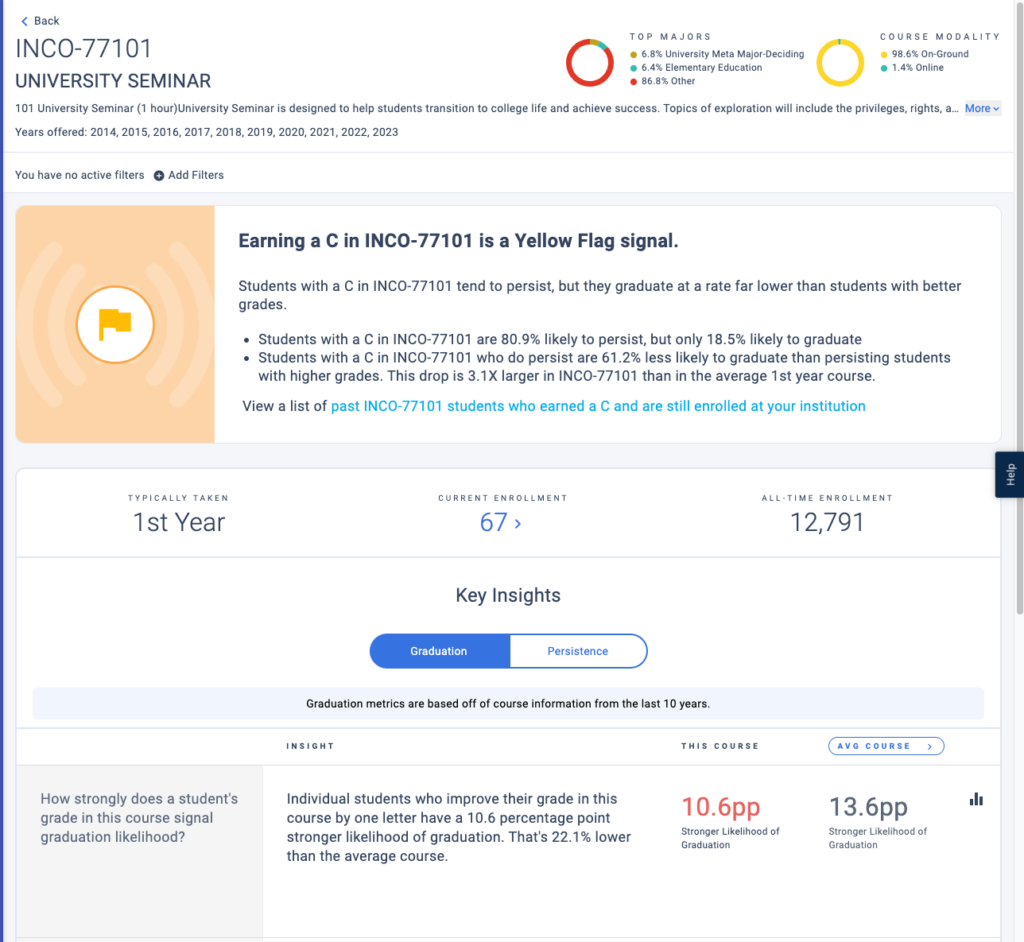
Uncovering Opportunities to Tailor Academic Support
This was the case when one Civitas Learning partner used actionable analytics within the Civitas Learning Course Insights solution to see that ENGL 1301 negatively impacted persistence and carried a significant drop, fail, withdraw (DFW) rate. With this knowledge, they were able to quickly adapt and roll out interventions to support student performance in the very next term, including:
- Meeting with course instructors weekly to understand what material was being covered and what assignments were due so they could provide support
- Offering APA and writing workshops for students enrolled in ENGL 1301
- Referring students to other academic supports to help students build the skills they need to succeed in ENGL 1301
Their strategies paid off as they quickly saw an increase in the persistence of students enrolled in ENGL 1301 from 59% to 70%.
This success underscores the importance of continuously monitoring leading success indicators and the power of providing tailored academic support.
Surprising Impact of First-Year Experience Course Revealed at Lakeland Community College
A preliminary analysis of early alert trends revealed that students were not performing well in Lakeland Community College’s mandatory First Year Experience (FYE) course. The First Year Course Advisory Committee looked deeper, using Course Insights to better understand the course’s impact on persistence and graduation and identify potential opportunities to address barriers to student success.
Leaders used Civitas Learning’s Course Insights solution to better understand how course performance impacts longer-term outcomes. Specifically, do poor grades in FYE link strongly to failure to graduate?
Course Insights revealed that those students who earned a D or F in the FYE only had a 3% likelihood of graduating compared to their peers. A further investigation into the grade distribution uncovered that 13% of students who’ve taken FYE during the last ten years failed the course. Overall, students performed better when the course was taken in person for the full semester instead of online or for shorter sessions within the semester.
This analysis of FYE’s impacts on persistence and graduation provided important input for leaders by uncovering that students with poor outcomes in FYE are at higher long-term risk. With this insight, leaders and their teams are reevaluating course design and institutional policies such as course modality and curriculum and offering it as pass/fail.
Course Insight Reveals Surprising Impact of FYE Course at Lakeland Community College
When leaders are proactive and assess the effectiveness of existing programs in real-time, they can enhance the overall student experience with improvements in curriculum design, student planning, and course sequencing. They can also refine course content, integrate innovative teaching techniques, and align curricular offerings with students’ ever-changing needs.
Improve Course Progression with Strategic Curriculum Design and Course Sequencing
Traditionally, data is warehoused and accessible only by certain departments or stakeholders– and when data is siloed, it’s all too easy for curricular bottlenecks to crop up. This is especially true when just one piece of data is examined in a vacuum instead of zooming out and seeing how different data points paint a larger picture of what’s working and what’s not.
For instance, DFW rates are considered a key piece of information when analyzing student success and course effectiveness. However, it’s critical that institutions go beyond DFW rates and look at more detailed insight into how individual courses impact persistence and completion to get the full story. Leaders can find patterns across terms and disciplines by looking for signals of larger systemic barriers to success. With this more precise view, opportunities to provide tailored support –in addition to potential curriculum adjustments and increased professional development for faculty– reveal themselves.
When data is democratized, it opens dialogue and solutions become more dynamic. Giving multiple colleges or departments access to Course Insights encourages teams to openly share how they interpret the data, making their action plans more innovative and aligned with existing initiatives while offering greater assurance that new interventions will work. For example, it’s critical to understand how courses from across the institution –not simply within each major– impact students’ performance.
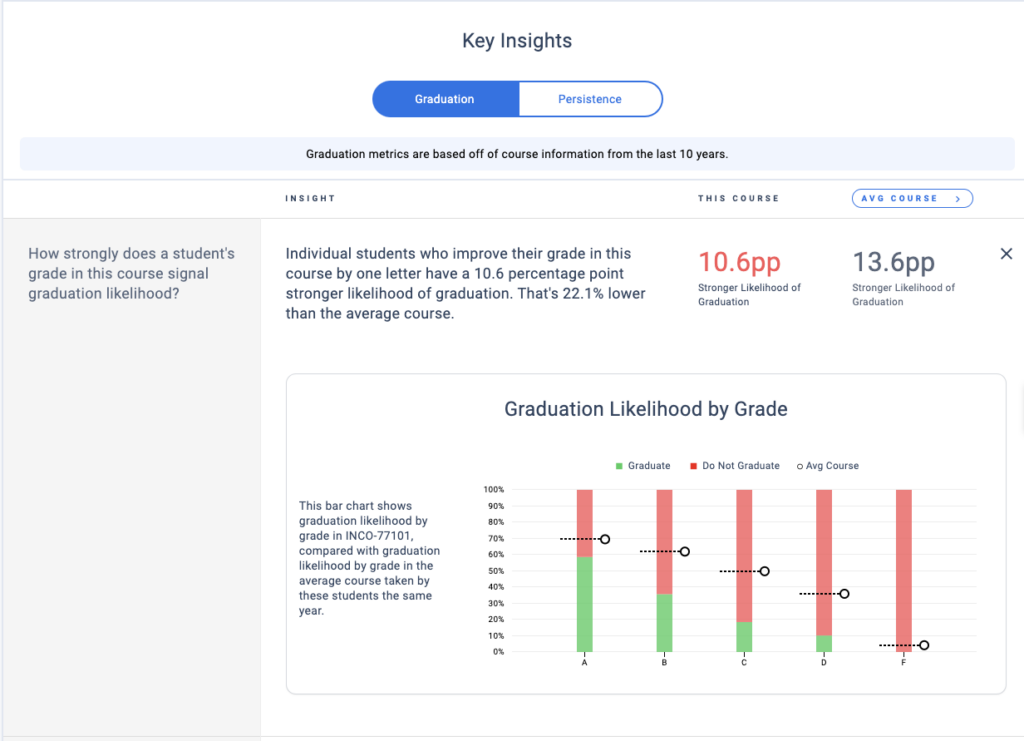
Identifying Course Impact on Persistence Improve Course Experiences at the University of Texas at San Antonio
This played out at the University of Texas at San Antonio (UTSA), where their team discovered that history courses were a bottleneck for their environmental science majors. Knowing exactly how course requirements owned by other departments impacted majors in different programs gave the UTSA team the information they needed to make data-informed decisions and improve their initiatives.
By analyzing data on persistence and completion likelihood, course completion rates, and student performance, institutions can identify courses that act as stumbling blocks for student progression. With this knowledge, teams can collaborate to redesign course structures or sequencing, adjust teaching methodologies, or introduce supplementary resources to alleviate challenges and facilitate smoother academic pathways for students.
UTSA offers a great example of how student support can be enhanced by utilizing data-activated practices beyond the classroom. Course Insights helped them understand the impact of their curriculum across disciplines. This allows them to provide professional development opportunities for faculty to improve their students’ classroom experience and connect students to the appropriate resources, which tripled students’ use of tutors for especially challenging courses.
Moreover, improving data agency across their institution and refining how teams identify, access, and use data to inform decisions enabled UTSA to update nine core areas that showed significantly different persistence rates. Ultimately, they were empowered to utilize predictive signals from more than 10 years of specific curriculum analytics to successfully redesign courses, improve student planning and course sequencing, enhance faculty development, and alleviate curricular bottlenecks.
UTSA Achieves 16% Retention Lift with Data-Activated Student Support Ecosystem
Beyond academic support, institutions can use insight into a course’s impact on persistence and completion to meet the holistic needs of students, including identifying students who may benefit from additional resources such as tutoring, supplemental instruction, or skills workshops. By providing comprehensive support systems –including academic assistance tailored to student’s real-time needs– institutions can better utilize their resources and deliver the right support to the right students, fostering an environment where every student feels valued, supported, and empowered to succeed.
Civitas Learning Partners like Lakeland Community College, UTSA, and others continue to innovate– going above and beyond to enhance student success and retention. By uncovering actionable insights and using the power of leading indicators, institutions can facilitate strategic interventions that remove barriers to success, provide tailored support, and create an inclusive learning environment where every student has the opportunity to thrive.
For more information on how course insights can support improved academic performance, check out Civitas Learning’s Leadership Analytics solution here.
